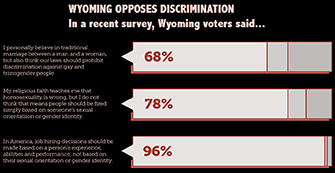Changes in workplace policy may be coming in Wyoming.
A non-discrimination bill has been introduced in the Wyoming State Senate that forbids Wyoming employers from discriminating based on people’s sexual orientation or gender identity. The state already has discrimination laws on the books that encompass race, sex, age, creed, color, national origin, ancestry and disability.
“There are cases of significant firings, employees being denied promotions, intimidation and workplace fear, regardless of job performance, qualification or talent. What is happening in Wyoming’s workplace is wrong. It is counter to attracting new business development and employee recruitment,” Wyoming Business Alliance President Bill Schilling said. “Workplace discrimination is just bad business, so of course we support this bill.”
The Wyoming Business Alliance is not the only group supporting this bill. Many individuals and groups in Wyoming are pushing for non-discrimination in the workplace. One of those groups is called Compete Wyoming.
Compete Wyoming is dedicated to strengthening Wyoming’s anti-discrimination law to prevent workplace discrimination against gay and transgender workers. In the results of a recent survey reported on the Compete Wyoming’s website, 68 percent of Wyoming voters personally believe that traditional marriage should be between a man and a women, but also think our laws should prohibit discrimination against gay and transgender people.
One UW student agrees with the aim of the proposed legislation
Mark O’Dell, a junior majoring in Chemical Engineering said that a person’s job performance should be the only thing they can get fired for.
“Personally I think who someone is attracted to or how they chose to see themselves should not be important when it comes to finding or having a job,” O’Dell said.
Over the past four years state residents have filed more than 40 workplace complaints concerning sexual orientation. Religious organizations, churches and associations would be exempt from the law if passed.



